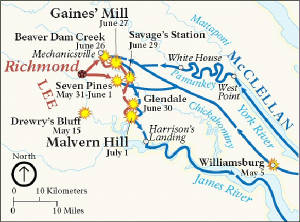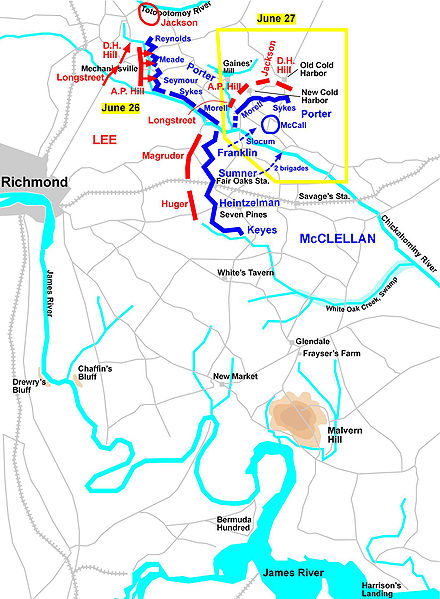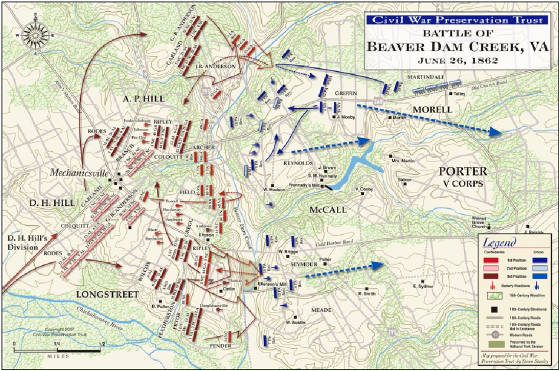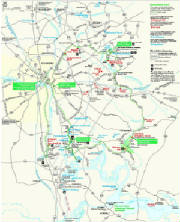|
Battle of Mechanicsville
Civil War Battle of Mechanicsville, Virginia, Map
| Civil War Battle of Mechanicsville, Virginia, Map |

|
| Richmond National Battlefield Park |
Battle of Mechanicsville, Virginia
Map of Union and Confederate Army Battlefield Positions
| Union and Confederate Armies: Battlefield Map |

|
| Union Army versus Confederate Army |
Civil War Battle of Mechanicsville, Virginia
Map of Union and Confederate Advance, Engagement, Repulse,
and Retreat
| Civil War Battle of Mechanicsville Map |

|
| (Click to Enlarge) |
Richmond, Virginia
Map of Surrounding Civil War Battles
| Civil War Battles around Richmond, Virginia, Map |

|
| Battle of Mechanicsville, aka Battle of Beaver Dam Creek |
Recommended
Reading: The Official Virginia
Civil War Battlefield Guide. Review: This
is one of the most useful guides I've ever read. Virginia was host to nearly 1/3rd of all Civil War engagements, and
this guide covers them all like a mini-history of the war. Unlike travel books that are organized geographically, this guide
organizes them chronologically. Each campaign is prefaced by a detailed overview, followed by concise (from 1 to 4 pages,
depending on the battle's importance) but engrossing descriptions of the individual engagements. These descriptions make this
a great book to browse through when you're not in the car. Most sites' summaries touch on their condition--whether they're
threatened by development (as too many are) and whether they're in private hands or protected by the park service. Continued
below…
But the maps
are where this book really stands out. Each battle features a very clear map designating army positions and historical roads,
as well as historical markers (the author also wrote the /A Guidebook to Virginia's
Historical Markers/), parking, and visitors' centers. Best of all, though, many battles are illustrated with paintings or
photographs of the sites, and the point-of-view of these pictures is marked on each map!
Recommended
Reading: To The Gates of Richmond: The Peninsula Campaign,
by Stephen Sears. Description: To the Gates of Richmond charts the Peninsula Campaign of 1862, General George McClellan’s
grand scheme to march up the Virginia Peninsula
and take the Confederate capital. For three months, McClellan battled his way toward Richmond,
but then Robert E. Lee took command of the Confederate forces. In seven days, Lee drove the cautious McClellan out, thereby
changing the course of the war. Intelligent and well researched, To the Gates of Richmond vividly recounts one of the bloodiest
battles of the Civil War. Continued below…
Publishers
Weekly: Sears complements his 1988 biography of George McClellan with this definitive analysis of the general's principal
campaign. McClellan's grand plan was to land an army at Yorktown, move up the Virginia peninsula toward
Richmond,
and fight a decisive battle somewhere near the Confederate capital, thereby ending the Civil War while it was still a rebellion
instead of a revolution. The strategy failed in part because of McClellan's persistent exaggerations of Confederate strength,
but also because under his command the Federals fought piecemeal. The Confederates were only marginally more successful at
concentrating their forces, but Sears credits their leaders, especially Lee, as better able to learn from experience. Confederate
victory on the Peninsula meant the Civil War would continue.
The campaign's heavy casualties indicated the kind of war it would be. About the Author: Stephen W. Sears is the author of
six award-winning books on the Civil War. He lives in Connecticut.
Recommended
Reading: The Richmond Campaign of 1862: The Peninsula and the Seven Days (Military Campaigns of the Civil War) Description: The Richmond
campaign of April-July 1862 ranks as one of the most important military operations of the first years of the American Civil
War. Key political, diplomatic, social, and military issues were at stake as Robert E. Lee and George B. McClellan faced off
on the peninsula between the York and James Rivers. The climactic clash came on June 26-July 1 in what became known as the
Seven Days battles, when Lee, newly appointed as commander of the Confederate forces, aggressively attacked the Union army.
Casualties for the entire campaign exceeded 50,000, more than 35,000 of whom fell during the Seven Days. Continued below…
This book offers
nine essays in which well-known Civil War historians explore questions regarding high command, strategy and tactics, the effects
of the fighting upon politics and society both North and South, and the ways in which emancipation figured in the campaign.
The authors have consulted previously untapped manuscript sources and reinterpreted more familiar evidence, sometimes focusing
closely on the fighting around Richmond
and sometimes looking more broadly at the background and consequences of the campaign. From the Inside Flap: The Richmond
campaign of April-July 1862 ranks as one of the most important military operations of the first years of the American Civil
War. These nine original essays, by well-known Civil War historians, explore questions regarding high command, strategy and
tactics, the effects of the fighting upon politics and society both North and South, and the ways in which emancipation figured
in the campaign. Contributors: William A. Blair, Keith S. Bohannon, Peter S. Carmichael, Gary
W. Gallagher, John T. Hubbell, R. E. L. Krick, Robert K. Krick, James Marten, and William J. Miller. About the Author: Gary
W. Gallagher is John L. Nau III Professor of History at the University of Virginia.
He has published widely on the Civil War, including six previous titles in the Military Campaigns of the Civil War series.
Recommended
Reading: Seven Days Before Richmond: McClellan's Peninsula Campaign Of 1862 And Its Aftermath (Hardcover). Description: Combining meticulous research with a unique perspective,
Seven Days Before Richmond examines the 1862 Peninsula Campaign of Union General George McClellan and the profound effects
it had on the lives of McClellan and Confederate General Robert E. Lee, as well as its lasting impact on the war itself. Rudolph
Schroeder’s twenty-five year military career and combat experience bring added depth to his analysis of the Peninsula
Campaign, offering new insight and revelation to the subject of Civil War battle history. Continued below…
Schroeder analyzes
this crucial campaign from its genesis to its lasting consequences on both sides. Featuring a detailed bibliography and a
glossary of terms, this work contains the most complete Order of Battle of the Peninsula Campaign ever compiled, and it also
includes the identification of commanders down to the regiment level. In addition, this groundbreaking volume includes several
highly-detailed maps that trace the Peninsula Campaign and recreate this pivotal moment in the Civil War. Impeccably detailed
and masterfully told, Seven Days Before Richmond is an essential addition to Civil War scholarship. Schroeder artfully enables
us to glimpse the innermost thoughts and motivations of the combatants and makes history truly come alive.
Recommended Reading: Sword Over Richmond: An Eyewitness History Of McClellan's Peninsula
Campaign (Hardcover). Description: Publishers Weekly: Union General
George McClellan's attempt to capture the Confederate capital in 1862, one of the most significant campaigns of the Civil
War, has been comparatively neglected by popular historians, probably because of its complexity and seeming lack of coherent
structure. Wheeler recounts it in a way that should attract a large readership: the judicious use of extensive quotes by participants
and observers, linked by expositional passages of remarkable clarity, supported by good maps. Continued below…
The political
and strategic aspects of the campaign are given fair due, but the emphasis is on the human element. The central incidents
on which the personal narratives hang include the Monitor-Merrimack battle, "Stonewall" Jackson's
diversionary maneuvers in the Shenandoah Valley and Lee's
daring counteroffensive in the Seven Days Battles. The book is rich in dramatic anecdote, telling detail and eloquence.
Recommended
Reading: Extraordinary Circumstances: The Seven Days Battles. Description: Extraordinary Circumstances tells the story of the
Seven Days Battles, the first campaign in the Civil War in which Robert E. Lee led the Army of Northern Virginia. One of the
most decisive military campaigns in Western history, the Seven Days were fought in the area southeast of the Confederate capitol
of Richmond from June 25 to July 1, 1862--and began a string of events leading to the Emancipation Proclamation and the shift
toward total war. About the Author: Brian K. Burton is Associate Professor of Management and Director of the MBA program at
Western
Washington University. Continued below...
Reviews:
"A full and
measured account marked by a clear narrative and an interesting strategy of alternating the testimony of generals with their
grand plans and the foot soldiers who had to move, shoot, and communicate in the smoky underbrush." -- The Virginia Magazine
"A thoroughly
researched and well-written volume that will surely be the starting point for those interested in this particular campaign."
-- Journal of American History
"A welcome
addition to scholarship that should be the standard work on its subject for some time to come." -- Journal of Military History
"A well-written,
thoroughly researched study of the Seven Days.... Provides thorough and reasonable analyses of the commanders on both sides."
-- Georgia
Historical Quarterly
|

